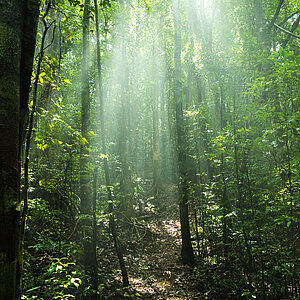Catalyzing private sector commitment to implement the Bonn Challenge – a platform for success
To achieve the goals of the Bonn Challenge, additional investment is required from the private sector. The project therefore helped companies integrate forest and landscape restoration (FLR) into supply chains relevant for forests while it also promoted the FLR approach. The project identified methods, costs and benefits for this integration, and the results were used to develop business models that illustrate the economic, social and ecological benefits that FLR has to offer. FLR was also analysed in terms of its significance for the obligations needing to be met by the public and private sectors for zero net deforestation (ZND). Companies will be supported in their FLR and ZND activities by a knowledge community focusing on FLR in supply chains, which the project has set up based on business models and other experience with key private sector actors. A guideline to inform company initiatives and policymakers has also been produced.
- Countries
- Ghana, Peru, Tanzania
- IKI funding
- 1,999,725.00 €
- Duration
- 01/2019 till 06/2023
- Status
- completed
- Implementing organisation
- International Union for Conservation of Nature and Natural Resources (IUCN) - Switzerland
- Political Partner
-
- Ministry of Lands and Natural Resources - Ghana
- National Forest and Wildlife Authority (SERFOR) - Peru
- Tanzania Forest Service (TFS)
State of implementation/results
- Project completed.
- The guide for agribusinesses on landscape restoration in supply chains can now count on the Food and Land Use Coalition (FOLU) as a co-author. Currently under peer-review, it will be launched end 2022. It will be making the case for more investment in restoration as well as provide a tailored methodology to assess and plan landscape restoration in agricultural supply chains.
- The Restoration Opportunity Assessment Methodology (ROAM), a multi-stakeholder approach to assessing forest landscape restoration is now finalized in Ghana, Tanzania and Peru. The planned restoration interventions, to be validated by the companies and the local producers are agroforestry systems in Peru and Ghana, to address issues around soil erosion, pollination and carbon sequestration. In Tanzania, the analysis is showing good potential for riverine restoration on a sugarcane private estate to increase resilience to inundations and ensure compliance of the agribusiness while further options are identified upstream for the local communities.
- The outreach and communication work to expand a community of practice on restoration in supply chains has continued through webinars, including a technical one to the World Cocoa Foundation.
- In collaboration with Olam, ECOM and Kilombero Sugarcane Company, small producers and civil society organizations, have collaborated to map out restoration opportunities.
- The International Union for Conservation of Nature (IUCN) analyzed the business model of the companies in the landscape to link it to the forest landscape restoration (FLR) intervention and have a business case relevant for the company as well as landscape actors.
- In addition, at global level, IUCN is reaching out to key private sector platforms and businesses to develop a community of practice on forest landscape restoration in supply chains.
- For more information, visit the project webpage (www.iucn.org/…).
Latest Update:
12/2024
Project relations
Legend:
The link has been copied to the clipboard





